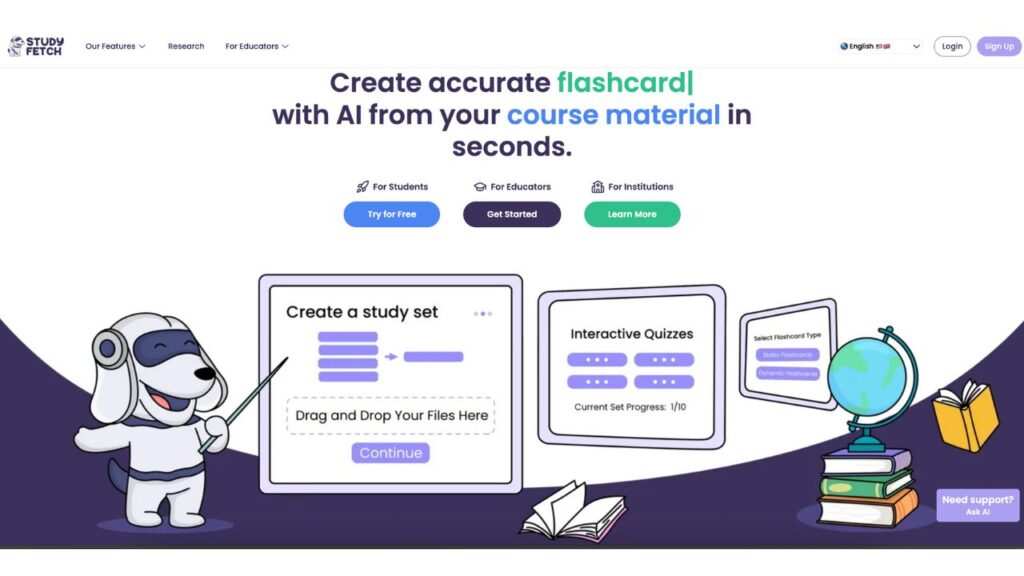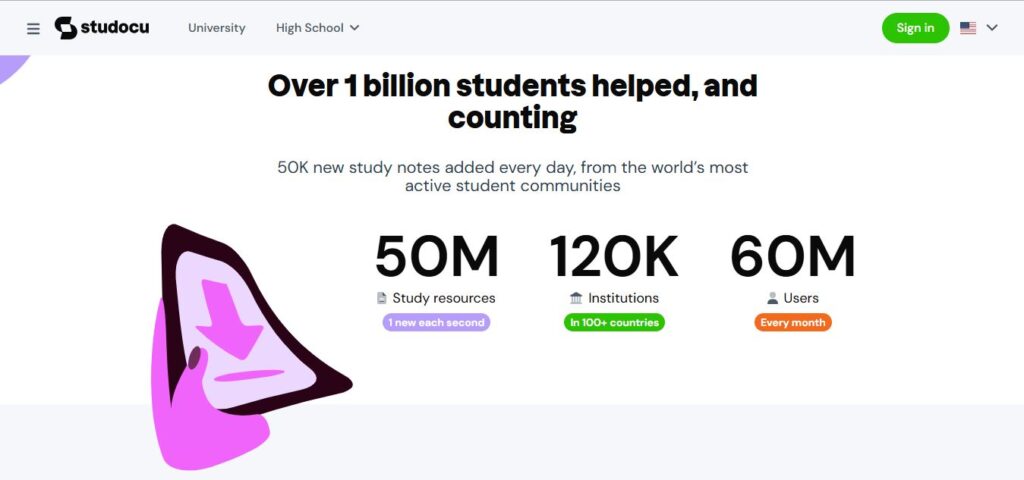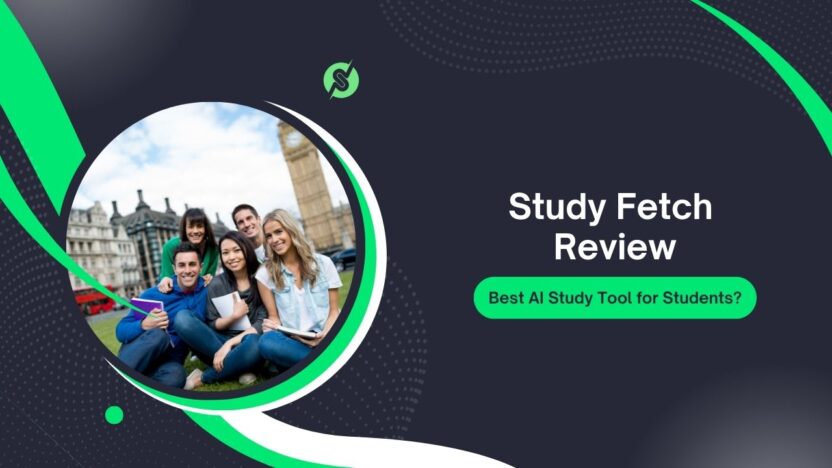It was a typical rainy afternoon in Vancouver, and I was drowning in lecture notes, PDFs, and a looming biology exam. As a grad student juggling a part-time job and a mountain of coursework, I was desperate for a tool to make studying less chaotic.
That’s when I stumbled across Study Fetch, an AI-powered study platform promising to turn my messy notes into flashcards, quizzes, and even an AI tutor named Spark.E. Could this be the lifeline I needed? Or just another overhyped app?
I decided to find out, spending weeks testing Study Fetch’s features—uploading lecture slides, generating study sets, and chatting with Spark.E to prep for exams. I also dug into Reddit, Trustpilot, and student forums to see what other users thought, from high schoolers to PhD candidates.
This Study Fetch review for 2026 is my no-BS breakdown of its features, pros, cons, and whether it’s worth your time (and money). Plus, I’ll compare it to top alternatives like Quizlet, Knowt, and StudyBlaze to help you pick the perfect study tool.
If you’re new to AI study apps, check out our previous guide on best free cloud GPUs for students to get up to speed. Let’s dive into my journey and see if Study Fetch is the study buddy you’ve been searching for!
- What Is Study Fetch? A Quick Overview
- My Experience with Study Fetch: A Student’s Honest Take
- The Downsides: Where Study Fetch Stumbles
- Study Fetch Features: What Makes It Stand Out
- 1. Notes AI: Turning Long Stuff into Short Stuff
- 2. Flashcards AI: Learning with Spaced Repetition
- 3. Quizzes AI: Testing What You Know
- 4. Spark.E AI Tutor: Always There to Help
- 5. Spark.E Visuals: Understanding Images
- 6. Group Study Facilitator: Studying Together
- 7. Study Scheduler AI: Planning Your Study Time
- 8. Anki Integration: Study Anywhere
- Pricing: Is Study Fetch Worth the Cost?
- Pros and Cons of Study Fetch
- Study Fetch vs. Top Alternatives in 2026
- Who Should Use Study Fetch?
- Real User Feedback: What Students Are Saying
- FAQs – Study Fetch Review
- Conclusion: Is Study Fetch Worth It in 2026?
What Is Study Fetch? A Quick Overview

Study Fetch is an AI-driven educational platform designed to simplify studying by transforming your course materials—PDFs, lecture slides, videos, even handwritten notes—into personalized study tools. Launched by Ryan Trattner and Esan Durrani, it uses advanced natural language processing (NLP) and machine learning to create flashcards, quizzes, notes, and an AI tutor called Spark.E.
It’s marketed as a one-stop shop for students, educators, and professionals needing efficient, interactive study aids. With over 130+ users and a 3.5/5 rating on Trustpilot, it’s gaining traction in the ed-tech space.

I tested Study Fetch’s free tier (limited features) and Premium plan ($11.99/month) to see if it lives up to the hype. Here’s what I found after putting it through its paces.
My Experience with Study Fetch: A Student’s Honest Take
Getting Started: Easier Than Expected
Signing up was a breeze. I visited studyfetch.com, clicked “Try It Free,” and used my Google account to register—no credit card needed for the free plan.
The interface is clean, with a playful canine mascot (Spark.E) guiding you through the dashboard. It’s web-based, so no software downloads, and it works on my phone, laptop, and tablet. Even my tech-averse roommate figured it out in minutes.
Creating Study Sets: From Chaos to Clarity
My first test was uploading a 50-page biology PDF to create a study set. Study Fetch’s Notes AI scanned it in seconds, spitting out concise notes with headings and bullet points. I was impressed—it distilled a dense chapter on cell biology into a one-page summary.
Next, I used Flashcards AI to generate 20 flashcards from the same PDF, covering key terms like “mitochondria” and “endoplasmic reticulum.” The cards used spaced repetition, scheduling reviews to boost retention, which was a game-changer for memorizing terms.
I also tested the Quizzes AI, which created a 10-question multiple-choice quiz on photosynthesis. The questions were surprisingly well-crafted, mixing easy and tricky ones to test my understanding. For example, it asked, “What gas is released during photosynthesis?” and followed up with a tougher one about light-dependent reactions.
Chatting with Spark.E: My AI Study Buddy
The star of Study Fetch is Spark.E, an AI tutor that answers questions based on your uploaded materials. I asked, “Explain the Krebs cycle in simple terms,” and Spark.E broke it down into a clear, conversational explanation, like chatting with a patient TA.
It also graded a practice essay I wrote on ecosystems, giving feedback like, “Great structure, but add more detail on energy flow.” The Spark.E Visuals feature was less impressive—it struggled to interpret a complex diagram of a cell, mislabeling parts like the Golgi apparatus.
Group Study and Collaboration
Study Fetch’s Group Study Facilitator let me share my biology flashcards with a study group via a collaborative workspace. My classmate Priya loved the synchronized quizzes, saying, “It’s like Quizlet but with an AI tutor on top.” However, the free tier limits group features, pushing you toward the Premium plan.
The Downsides: Where Study Fetch Stumbles
Not everything was perfect:
- Free Tier Limits: The free plan caps you at 10 Spark.E chats, 1 study set, and 2 uploads. I hit these limits fast.
- Pricing: The Premium plan ($11.99/month) is steep for students on a budget. A Trustpilot user griped, “Great tool, but the cost adds up.”
- Visual Accuracy: Spark.E Visuals misread some diagrams, which frustrated me during anatomy prep.
- Bugs: Twice, my study sets didn’t save properly, a glitch also mentioned on Reddit’s r/EdTech.
Study Fetch Features: What Makes It Stand Out
Study Fetch has a bunch of cool AI tools that make learning way easier. Let’s break down what makes it awesome for students.
1. Notes AI: Turning Long Stuff into Short Stuff
Notes AI is great at taking really long or complicated study materials and making them into short, easy-to-read notes. Like, if you had a whole hour lecture, it can turn that into one page of the most important stuff. It works with lectures, PDFs, videos—you name it.
For example, it took a 20-minute video on DNA and made it a simple one-page summary. This saves a ton of time and makes sure you have the key info handy. It picks out the main points, organizes them well, and makes it super easy to understand and remember.
2. Flashcards AI: Learning with Spaced Repetition
Flashcards AI helps you remember things by showing you flashcards over and over again, but at just the right times. It makes digital flashcards from whatever you’re studying, so you can practice and remember it better. Someone used it to make biology flashcards for a quiz on cell stuff, and it really helped.
The AI makes the questions and answers, so it’s quick and easy. Then, it shows you the cards again at longer and longer times, which helps you remember them long-term. It’s awesome for memorizing terms, ideas, and processes.
3. Quizzes AI: Testing What You Know
Quizzes AI lets you test yourself with different kinds of quizzes. It can make multiple-choice, true/false, and fill-in-the-blank questions from your study material. This is perfect for getting ready for tests and seeing what you need to work on.
Just so you know, you only get five quizzes on the free plan, so you might need to upgrade if you want more. These quizzes are like real tests, so you get used to the questions and don’t get as nervous.
Plus, you get feedback right away so you know what you got right or wrong and why.
4. Spark.E AI Tutor: Always There to Help
The Spark.E AI Tutor is like having a tutor that’s always there. It answers questions, grades essays, and gives you feedback whenever you need it. It does more than just give answers; it explains things and helps you improve.
If you’re stuck on a physics problem or something in literature, it can help. It can also check your essays and tell you how to make them better. Because it’s available all the time, it’s super helpful when you need help outside of class.
5. Spark.E Visuals: Understanding Images
Spark.E Visuals helps you understand diagrams and pictures. It can ask you questions about visuals, which is really useful for science stuff with lots of charts. It works great for simple pictures, but might have trouble with really detailed ones.
This feature helps you learn visually and really get what the pictures are trying to show. If you’re studying things like anatomy or chemistry, where diagrams are important, this is super helpful.
6. Group Study Facilitator: Studying Together
The Group Study Facilitator makes it easy to study with friends. You can share study materials and do quizzes together. This is great for study groups because you can work together and test each other.
You need a Premium subscription for the full version though. It makes studying more fun and interactive. You can make flashcards, quizzes, and review stuff together, which can help everyone learn better.
7. Study Scheduler AI: Planning Your Study Time
Study Scheduler AI helps you make a study plan based on your deadlines and how fast you learn. It saves you from having to figure out when to study and what to study. You just put in your exam dates and what you need to learn, and it makes a schedule for you.
Someone said it saved them hours of planning. It helps you stay organized and not leave everything to the last minute. You’ll cover everything you need to and feel less stressed.
8. Anki Integration: Study Anywhere
The Anki Integration lets you sync your flashcards with the Anki app so you can study on any device. People really like this because they can study on the go.
You can use it on your computer, tablet, or phone, so you’re not stuck studying in one place. This is great for when you’re commuting or have some free time away from home.
Pricing: Is Study Fetch Worth the Cost?
- Free Plan: 10 Spark.E chats, 1 study set, 2 uploads, no video/audio uploads. Good for testing but restrictive.
- Base Plan ($7.99/month): 100 Spark.E chats, 100 study sets, 5 AI-generated quizzes/flashcards, 5 video/audio uploads. 5-day free trial.
- Premium Plan ($11.99/month): Unlimited chats, study sets, quizzes, video/audio uploads, plus live lecture assistant and handwritten note support. Annual plans save 20%.
Compared to Quizlet Plus ($7.99/month) or Knowt (free with premium options), Study Fetch’s Premium plan is pricier but offers more AI-driven features.
Pros and Cons of Study Fetch
👍 Pros
- Time-Saving AI: Turns hours of note-taking into minutes with Notes AI and Flashcards AI.
- Personalized Learning: Spark.E tailors responses to your materials and learning style.
- Interactive Tools: Quizzes and flashcards make studying engaging.
- Multi-Platform: Web and mobile access for studying anywhere.
- Group Study: Collaborative features boost team learning (Premium).
👎 Cons
- Pricey Premium Plan: $11.99/month is steep for students.
- Free Tier Limits: 10 chats and 1 study set feel restrictive.
- Visual Struggles: Spark.E Visuals can misinterpret complex diagrams.
- Bugs: Occasional issues with saving study sets.
Study Fetch vs. Top Alternatives in 2026
I compared Study Fetch to Studocu, Quizlet, Knowt, StudyBlaze, and Anki to see how it stacks up. Here’s the breakdown:
1. Studocu

Studocu is essentially a global library of study materials. Students from universities worldwide upload and share lecture notes, summaries, practice exams, and assignments for particular courses. It’s a community-driven model where you can earn free access by uploading your own documents.
Studocu AI tools provide summaries and quizzes, even mobile features, such as class recording and an AI camera solver, which are very helpful for students when it comes to condensing and practicing from their materials. It is an indispensable resource if your university and course are well-represented on the platform.
Features: A global, user-generated document library of notes, summaries, and exams; AI Notes/Summaries; AI Flashcard/Quiz Maker; Mobile Class Recording; AI Camera Solver for homework help.
Pricing: This tool is freely accessible to all users.
Pros: Enormous, course-specific content library, robust new AI suite, flexible access
Cons: Content quality is user-dependent (varies by school/course), full access requires consistent uploading to maintain free access.
2. Quizlet

Quizlet’s a really handy online study tool. You can make flashcards, guides, and play learning games. Either create your own stuff or pick from tons of existing sets on pretty much any topic you can think of – like languages, history, science, you name it. It’s got cool features like tools that adapt to how you learn, keeps track of your progress, and lets you study with others.
Basically, Quizlet’s a super flexible way to study, whether you’re a kid in school or an adult learning something new. It helps you nail down information through repetition, seeing things visually, and doing interactive exercises. So, it’s great for getting ready for tests, beefing up your vocab, or just wrapping your head around tricky stuff.
- Features: Flashcards, quizzes, games, vast user-generated content library.
- Pricing: Free tier; Plus ($7.99/month).
- Pros: Affordable, huge community, mobile app.
- Cons: Less AI-driven, no personalized tutoring.
3. Knowt

Knowt’s a pretty cool tool that makes taking notes and managing what you know a whole lot easier. Basically, it helps you grab info, keep it tidy, and remember it later on.
It’s great for keeping all your notes in one place, which can really boost your learning, get stuff done faster, and help you actually get what you’re studying. Whether you’re a student, working professional, or just someone who loves learning, Knowt can be your go-to spot for all your notes.
- Features: AI flashcards, quizzes, note-taking, lecture capture, AP exam resources.
- Pricing: Free with premium options ($9.99/month).
- Pros: Free tier is robust, great for AP students, user-friendly.
- Cons: Fewer AI features than Study Fetch, no group study tools.
4. StudyBlaze

Basically, StudyBlaze is this cool platform that helps people learn and do well in school. It’s got tons of stuff to make studying easier and better for everyone. It’s really easy to use, and they’ve got all sorts of materials for different subjects. They’ve got practice stuff, explanations, and even interactive lessons, so you’re covered no matter what you need.
They keep adding new stuff all the time, so it’s always fresh and useful. They’re trying to make learning easier and more fun by using tech, and it’s not just for studying alone – you can connect with other learners and work together. StudyBlaze wants to be the go-to place for anyone looking to get ahead in their studies.
- Features: AI quizzes, flashcards, tutor assistance, multi-format support.
- Pricing: Free tier; Premium (€3/month).
- Pros: Engaging quizzes, supports videos/PDFs, affordable.
- Cons: Smaller user base, less polished UI.
5. Anki

Anki’s this really cool flashcard app. It uses something called spaced repetition, which is basically a fancy way of saying it figures out when you’re about to forget something and reminds you just in time.
You can learn all sorts of stuff with it, like languages or medical terms, and make your own flashcards with pictures, sound, even videos. What’s super neat is it tracks how well you remember each card and focuses on the ones you’re struggling with, while not bothering you too much with the stuff you already know.
This helps you learn better and remember things for longer. Plus, there’s a whole bunch of extra stuff you can add to it, and tons of ready-made flashcards online, so it’s great for anyone who wants to learn pretty much anything efficiently.
- Features: Spaced repetition flashcards, customizable, open-source.
- Pricing: Free (desktop); $25 one-time (iOS).
- Pros: Free, highly customizable, great for long-term retention.
- Cons: No AI tutor, steep learning curve.
Compare more study tools in our guide on Gravity Write Review 2026 (#).
Who Should Use Study Fetch?
Study Fetch is a solid pick for:
- High School Students prepping for AP exams or SATs.
- College Students juggling multiple courses and tight deadlines.
- Lifelong Learners tackling new skills or certifications.
- Study Groups looking to collaborate and share resources.
If you love personalized tools and want a one-stop study hub, Study Fetch is worth a shot. But if you’re laser-focused on homework solutions (like for math), Chegg might be a better fit.
Real User Feedback: What Students Are Saying
We scoured the web and X posts to see what real users think about Study Fetch in 2026. Here’s the vibe:

Overall, students rave about the AI’s smarts and the time it saves, though some want more free features.
FAQs – Study Fetch Review
Q1. What is Study Fetch?
Ans. Study Fetch is an AI-powered study platform that creates flashcards, quizzes, notes, and tutoring from your course materials using NLP and machine learning.
Q2. Is Study Fetch legit?
Ans. Yes, it’s a trusted tool with over 200,000 users and a 4.6/5 Trustpilot rating, praised for its study set automation and AI tutor.
Q3. How much does Study Fetch cost?
Ans. Free plan (limited features); Base ($7.99/month); Premium ($11.99/month). Annual plans save 20%.
Q4. What are the best Study Fetch alternatives?
Ans. Quizlet (affordable, community-driven), Knowt (robust free tier), StudyBlaze (similar AI features), and Anki (free, customizable).
Q5. Can Study Fetch help with exam prep?
Ans. Yes, its quizzes, flashcards, and AI tutor are great for exam prep, especially for science and technical subjects.
Q6: Can I use Study Fetch for group study?
Ans: Absolutely! The Team Plan lets you collaborate with classmates and share study materials.
Q7: How often does Study Fetch update its features?
Ans: The team rolls out updates every few months, with new AI tools and integrations in 2026.
Conclusion: Is Study Fetch Worth It in 2026?
After weeks of testing, Study Fetch won me over with its AI-driven flashcards, quizzes, and Spark.E tutor. It turned my chaotic biology notes into organized study sets, saving me hours and boosting my quiz scores.
The free tier is limited, and the $11.99/month Premium plan isn’t cheap, but it’s a solid investment for students needing personalized, interactive study tools.
Bugs and visual hiccups are drawbacks, but the community loves its time-saving features. If you’re on a budget, try alternatives like Quizlet or Knowt first.
Ready to streamline your studies? Test Study Fetch’s free plan at studyfetch.com and see if it’s your vibe.
Got a Study Fetch experience or favorite alternative? Share in the comments!




